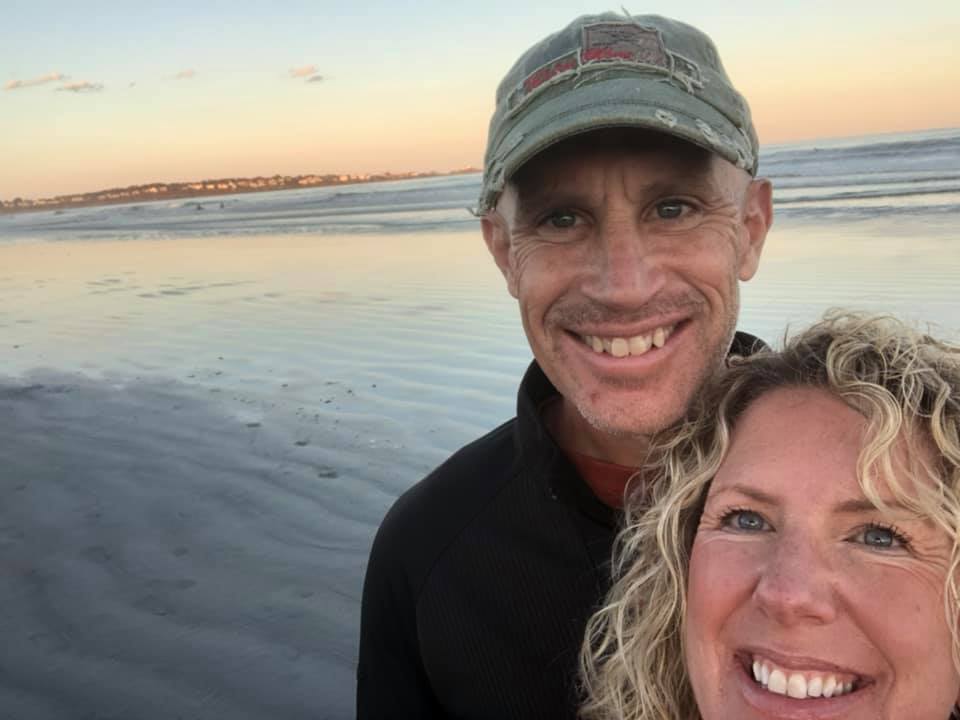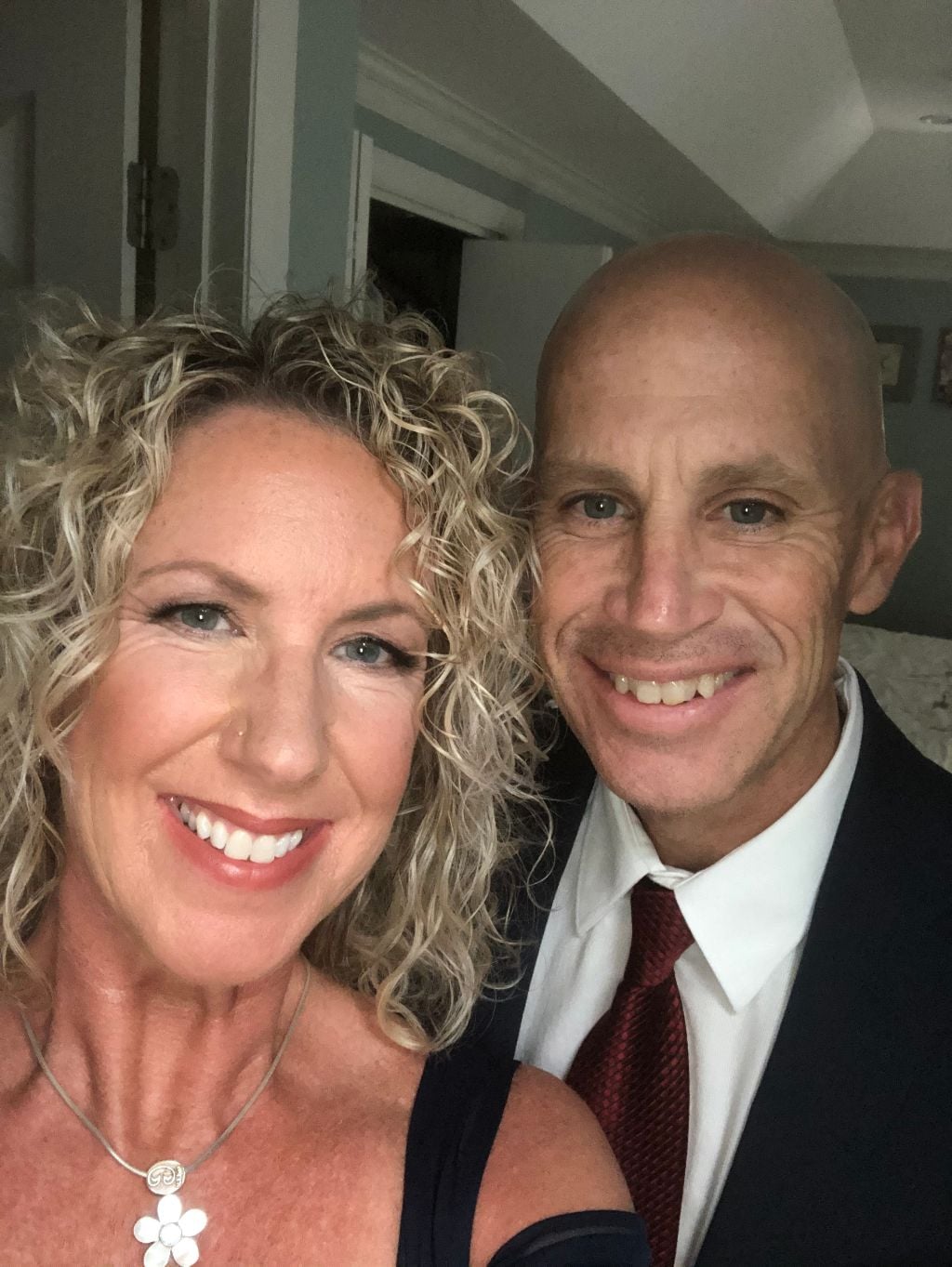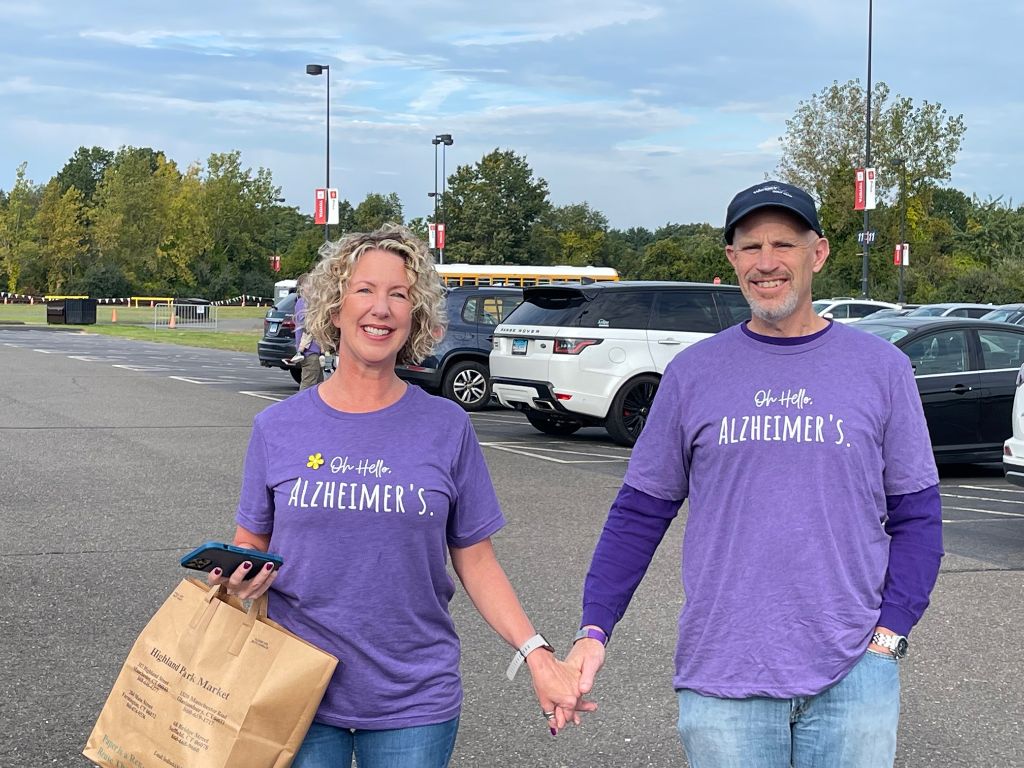Peter Marshall was diagnosed with early-onset Alzheimer’s at age 53 in 2018 after his wife and caregiver, Lisa, noticed his memory issues and cognitive decline. Within just three years his disease progressed aggressively, requiring around-the-clock care.
Alzheimer’s disease is the most common form of dementia. It affects memory, thinking, and behavior. It often progresses to the point where it affects daily activities and functions. Advancing age is the most significant risk factor for Alzheimer’s, with only 5% of cases occurring in people younger than 65. In cases of Alzheimer’s disease that occur in someone under age 65, the disorder is known as early-onset (or younger-onset) Alzheimer’s disease.
Diagnosis and Caregiving
When Lisa initially noticed Peter’s issues, she took him to his primary care physician, who ordered blood work, an MRI, and a referral to see a neurologist. Peter completed hours of cognitive testing, and the primary care physician found Peter’s results “alarming for a person with Peter’s education.” However, Lisa knew something wasn’t right and found another neurologist who completed additional cognitive tests and a spinal tap, and Peter received his diagnosis of Early Onset Alzheimer’s disease.
Peter experienced myoclonic seizures and treated those with anti-seizure medications for some time. He also takes Zoloft for depression and Ativan as needed for anxiety, which he suffers from significantly when separated from Lisa. Peter also takes Seroquel, an anti-psychotic medication, to control delusions and hallucinations.
Lisa left her job about two years ago and is now a full-time caregiver for Peter.
“Peter’s Alzheimer’s has impacted our lives in every way possible. Peter has lost most of his cognitive and communicative abilities. He needs help with every aspect of personal care, including showering, toileting, and dressing. He has trouble understanding how to eat certain foods and cannot comprehend the simplest of instructions. His body is tired, he naps frequently, and his gait is slowing down. Peter used to run. In fact, he ran a marathon just five years ago. Now, he can barely walk our regular 3-mile route, and it takes him twice as long. Our life looks nothing like it did just a few years ago, and Peter’s quality of life is poor as he cannot take care of himself.”

Peter’s disease has progressed more rapidly than others, leaving Lisa to make the best of her remaining time with Peter and balance her well-being as a caregiver.
“Not much can be done. Making Peter as comfortable as possible, keeping a regular routine in place, making Peter feel safe and loved. I hired a nurse 40 hours a week which allows me to take a break.”
An Unexpected Wedding
Lisa and Peter initially met as neighbors in Harrisburg, Pennsylvania, and were married to other people at the time and were busy raising their children. They were close friends until Peter’s family moved to Connecticut. After some time without contact, Lisa and Peter reconnected when they discovered they were going through a divorce. They quickly became inseparable and were in a long-distance relationship for eight years until their children entered college. In 2009, Lisa moved to Connecticut to marry Peter, and the couple has been married for twelve years.
Once Peter’s condition began to decline, he lost many of the memories they expected to share for a lifetime, including the memory of his wedding. But, surprisingly, in a precious moment in 2020, Peter proposed to Lisa again despite being already married. Peter’s love touched Lisa, along with the rest of the world, as word got out about the beautiful story of a man who fell in love with his wife twice. News spread quickly, and Peter and Lisa’s love story featured on many popular news outlets, including Today, People, CNN, and NBC.
“It was so touching to me. He fell in love with me twice. I feel honored. I feel like a princess, like Cinderella. I’m the luckiest girl in the world,” Lisa told CNN.

Helping Others
Since becoming the primary caregiver for her husband, Lisa decided to help other caregivers facing the same diagnosis and their feelings of isolation and being alone. She created a blog titled “Oh Hello Alzheimer’s,” shared on her Facebook page, and she also shares photos and videos of Peter on Instagram.
Lisa is now motivated and fulfilled now by sharing information with other families and helping them prepare for what is ahead after diagnosis.
“Helping others. Giving families behind us a glimpse of what’s to come so they’re prepared for what lies ahead. Educating families on ways to cope, protect and manage their new lives.”
Lisa’s activism in the Alzheimer’s community has proven successful, with her thousands of followers on social media, the news coverage of her “second” wedding, and most recently raising over $55,000 for the Walk to End Alzheimer’s.

When asked what advice she would share with someone who has been diagnosed with Alzheimer’s, Lisa speaks passionately about living in the moment.
“Find JOY! Do everything you ever wanted to do RIGHT NOW. Find an excellent elder care attorney and get your affairs in order immediately.”
Lisa has found that the following advice has resonated with fellow caregivers:
“Practice the 3 A’s. It’s VERY hard to ask for help. People WANT to help, it makes them feel good, but they don’t know how.
- ACCEPT HELP
- ASK FOR HELP
- ARTICULATE WHAT YOU NEED
I started promising myself when people would say, ‘Let me know if you need any help.’ Instead of answering ‘Ok, thank you,’ I insisted that I answer, ‘ACTUALLY…’. I put myself on the hook to ACCEPT, ASK AND ARTICULATE what I need. Saying ‘Actually’ gives me pause to think about what I need at the moment; a meal for the freezer, someone to watch Peter while I take a shower, an hour in my house alone to take care of things I can’t when Peter is with me, moving something heavy, etc.”
Do you or someone you love have a Brain Story to share? We’d love to feature you! Head over to our Brain Story page to learn how to submit your Brain Story. To learn more about our mission to find a cure for brain and mental health-related disorders worldwide, please visit our website at The United Brain Association. If you’d like to receive updates, news, scheduled events, or more information about our ongoing donor-funded research projects, sign up for our email newsletter by clicking here. Together we can find a cure for brain disorders.
Media Coverage
You Are Not Alone
For you or a loved one to be diagnosed with a brain or mental health-related illness or disorder is overwhelming, and leads to a quest for support and answers to important questions. UBA has built a safe, caring and compassionate community for you to share your journey, connect with others in similar situations, learn about breakthroughs, and to simply find comfort.

Make a Donation, Make a Difference
We have a close relationship with researchers working on an array of brain and mental health-related issues and disorders. We keep abreast with cutting-edge research projects and fund those with the greatest insight and promise. Please donate generously today; help make a difference for your loved ones, now and in their future.
The United Brain Association – No Mind Left Behind




